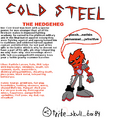Dropzone Commander

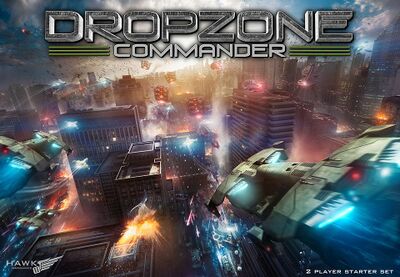 |
||
|---|---|---|
| Wargame published by TTCombat |
||
| No. of Players | 2+ | |
| Authors | David Lewis & Lewis Clarke | |
| First Publication | 2012 | |
| Essential Books | Dropzone Commander Core Rulebook (2.1.1). | |
"My mother said violence never solves anything."
"So?" Mr. Dubois looked at her bleakly."
"I'm sure the city fathers of Carthage would be glad to know that."
- – Robert A. Heinlein, Starship Troopers
Dropzone Commander (abbreviated as DzC) is a 10mm-scale science fiction wargame originally created and published by Hawk Wargames and now owned by TTCombat and a sister game to their orbital space combat game, Dropfleet Commander. As the name suggests, the game is mostly themed around highly-mobile units dropping into battle to contest and capture key objectives. Battles are set in the middle of larger cities on the so-called "cradle-worlds", previously human-controlled planets now overtaken by the Scourge, a parasitic race of squids who bumrushed humanity some hundred years ago.
DzC tend to be easy to get into, compared to many other, similar wargames: New units and updated rules are added in rulebooks bundled with lore and a continuation of the current plot, meaning you don't need new books every other week, packages with models cost half that of a Games Workshop unit box (though containing way less plastic), and a decent small army is easily aquired with the plastic starterboxes.
The Game
The key element that sets Dropzone Commander from other wargames is the emphasis on mobility. It's a 10mm game played on a 4'-by-4' board which is dense with terrain (mostly human buildings, since it's themed around retaking Earth and other human colony worlds), and each ground unit can only move a few inches per turn. The way they get to where they need to be is through dropships. So far, all of the factions have one "heavy dropship" that can carry nine standard vehicles or six heavy vehicles, a "medium dropship" that can carry three standard vehicles or two heavy vehicles, and a "light dropship" (or "assault" or "strike") with two variants: one that can carry a couple of light vehicles and one that can carry a couple of stands of infantry. The miniatures are all made to scale with each other, so you can magnetize your miniatures and literally place vehicles inside the cargo clamps of their transports.
The rules are freely available on the Dropzone Commander site.
The army builder, containing all the unit stats and points, is here.
A small companion game by the name of Flightwing Commander, using the fighter jets of the various factions, is available as well. Rules and unit stats here.
The Setting
Humanity, united under the Earth Administration Agency after a series of resource wars and climate devastation are reversed by breakthroughs in fusion energy, begin to explore the stars with the development of their first foldspace (faster than light) drive. The device is highly inaccurate without a beacon, or node, at the target destination, and so early exploration is essentially random. Little success is achieved as a result, but pioneers explore onward.
In 2342, observing this and deeming mankind ready for contact, an exploration frigate is approached and greeted by the Shaltari. The Shaltari act as friends at first, leading the humans to a number of planets ripe for colonization that come to be known as the Cradle Worlds, but it's all part of an attempt to manipulate them into serving as cannon fodder in their wars with other Shaltari tribes. Humanity doesn't take this well when they find out, but the Shaltari tribe responsible, the Apache, seemingly shrug it off and leave them be.
In 2506, another alien thing found its way to Earth: a mysterious White Sphere, the size of a baseball but heavy enough to require the strength of two men to move. It defied study, and when it was inadvertently connected to a network, it locked all the doors and somehow escaped before broadcasting a message that humanity was doomed and should escape by going to Vega IV in one year's time. Enough people took it seriously that a civil war nearly broke out. In the end, the ones who went to Vega IV with the intent of escaping were given coordinates to jump to, and while a battle broke out between them and a fleet of ships sent to stop them from leaving, most managed to escape in the chaos. The ships that were crippled and unable to jump were left floating in the void over Vega IV, and hunkered down to wait for help after the survivors jumped, not knowing it was not to come.
Two days later, more aliens showed up on Earth and conquered it. With the fleet still wrecked from the battle over Vega IV, there was no contest. About one percent of humanity managed to escape. The aliens simultaneously invaded the Cradle Worlds, and so the only ones who got away were those who jumped to frontier colonies and managed to reconfigure said colonies' foldspace beacons to keep the aliens, since called the Scourge, from finding them.
Over the next hundred and sixty years, humanity rebuilt itself into the United Colonies of Man, with the eventual goal of retaking Earth and the Cradle Worlds. As they made scouting missions, they discovered that some populations of humans had survived on Earth and the Cradle Worlds, forming a resistance against the Scourge. Descendants of the humans who escaped from Vega IV showed up as well. They were technologically advanced and augmented by cybernetics, calling themselves the Post-Human Republic, and offered an alliance. The UCM demanded an apology for fleeing and wrecking the fleet in the process. The post-humans refused, saying that history had proved them right, and furthermore told them that retaking Earth would be suicidal at this point. The UCM told them in no uncertain terms to leave and not pester them, and twenty-four hours later, launched the Reconquest.
The Cradle Worlds
Eden

Eden Prime was the first of the worlds to be settled on, and therefore the most developed and populated by the arrival of the Scourge. Three other planets in the system were also colonized over time, but no others reached the level of Eden Prime. Wishing to keep the planet from being despoiled as Earth had been, industrial and military development took place largely underground, leading to a vast network of tunnels and caverns that proved a boon to those fleeing from the Scourge.
Nearly the entire population were either killed or captured by the Scourge, with only a few managing to break through the enemy fleets and jump to the frontier colonies. The remainder hid underground, and many lost their lives to violence from human hands as turmoil and chaos ran rampant. Over time groups established themselves, but by then the Scourge, having secured the surface, began flushing out the underground, leaving only scattered remnants who would eventually come to form the Resistance.
Over a century and a half later, a respected leader of one of the Resistance groups by the name of Karl Foley spotted something fall from the sky near the capital city of New Troy. There they discovered the remnants of a spacecraft of unknown make or origin. Digging through the remains, they came across a plaque declaring the ship to be of the United Colonies of Mankind, and realized that somewhere out there, other humans had survived and were strong enough to launch spacecraft of their own. In time, the two would come to meet and form an alliance.
Foley was far from the only leader on Eden Prime, as the Resistance was a not a unified or coherent political entity, but just an overarching label for the survivors of the invasion. A tyrannical man by the name of Salakahn, who had established himself and his forces outside the city of Atlantia, was contacted by the PHR and offered material support in exchange for assistance on the surface and an agreement to push back against other Resistance groups and the soon to arrive UCM as directed.
Being the first established and most developed of the Cradle Worlds, Eden Prime was selected for the first push of the Reconquest, and on June 6th 2670, the UCM fleet arrived. The Scourge orbital defenses were swept aside, and the strike carrier UCMS Avenger was the first ship to break atmosphere and begin the campaign to eradicate the Scourge.
The cities of New Troy and Romagrad were cleared of the majority of Scourge, leaving them under UCM control. Atlantia proved a far more difficult target, with forces of the Scourge, PHR, and Salakahn's warriors all fighting against the UCM. As the tide turned against them and UCM victory loomed, Salakahn took one last parting shot on his way out. As the UCM pushed to take final control of the city, Salakahn detonated a nuclear weapon, obliterating the city along with all the UCM, PHR, and Scourge present, and fled to hide near the city of New Athens.
The cities of Star Casablanca and New Athens remained under Scourge control. UCM armor suffered great losses in Star Casablanca, to the point that morale cratered and insubordination was rampant. The situation there eventually pushed the UCM to deploy a tactical nuclear strike, finally eliminating their foe, but killing thousands of resistance fighters. New Athens proved resistant, with environmental conditions and Shaltari involvement delaying action against the city.
A vast industrial complex/city known as Odin's Foundry, stretching along a 2000-mile long scar into the mantle of the planet, was a primary point of contention with PHR and Resistance forces also involving themselves. The UCM took control of the complex, but the resistance forces present there was of a particularly brutal nature and not inclined to tolerate their presence.
Eden VII had served as a massive titanium mining operation. Scourge troops had firmly established themselves in the vast underground complexes, immune to orbital bombardment. While control was secured, a long battle of attrition was seemingly the only option to dislodge the last of the Scourge forces.
In orbit, Shaltari activity also proved a hinderance to actions throughout the system, and even occasional PHR encounters occur. For now though, Eden has been officially declared conquered, and local resistance fighters have begun to be enlisted in the ranks of the UCM.
Elysium

Sporting amazingly fertile soil, Elysium Prime had once served as the primary agricultural source for humanity, and proved to be just as useful to the Scourge in such a role.
While UCM fleets eliminated the Scourge in the void, the Shaltari arrived and have continuously harried the fleets with hit and run attacks, never committing to an engaged battle. Their primary targets have been supply ships, seemingly with the goal of dragging out the ground war as long as possible.
On the surface, the fighting has been almost entirely focused around the capital city of Triticum. Nearly half of all Scourge on the planet were contained in the city, and relief forces from elsewhere were a constant source of tension. Over time, the need for the Scourge to divert resources to other systems slowed the reinforcements to the point that the UCM could gain ground, and control of the city appeared imminent, until the Scourge attempted to break free of encirclement with a push by the bulk of their forces. Initially outnumbered, support from orbital bombardment turned the tide of the battle, but before a victory could be secured, the Shaltari forces that had long harassed the UCM chose this moment to commit and interrupt the bombardment. Engaging in orbit, the Shaltari fleet was defeated, but it had succeeded in prolonging the ground battle long enough to inflict grievous losses on the UCM troops.
The city of Granum is another primary target, but fighting elsewhere in the system and harassment from Resistance forces have prevented the UCM from taking control. While allied Resistance fighters, led by their commander Jessie Adams, proved invalulable due to their knowledge of the area and the underground tunnels, an opposing group under the control of Gunnarr, the Ferryman of Elysium, fought viciously in opposition.
With the defeat of the breakout attempt from Triticum, and the capture of it and Granum, Elysium was declared officially conquered and troops began redeployment to other theatres, although scouting actions from the PHR and Scourge have necessitated the presence of a garrison.
Shangri-La
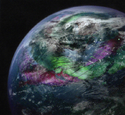
Considered the most beautiful and lush of the Cradle Worlds, Shangri-La served largely as a decadent tourist destination, and little in the way of industrial development had been built by mankind, instead erecting vast spaceports and resort complexes. The Scourge had a decidedly more utilitarian approach to the planet, and now large swatches of it had been strip-mined. The planet was attacked at a later stage in the reconquest, and so the Scourge had more time to prepare themselves, leading to heavier losses during planetfall. The nature of the planet surface also meant that it was impossible to contain enemy forces to any particular spot, and ground movements were limited to a crawl.
The Scourge continued to maintain a presence in space, and so orbital fighting continued over Shangri-La until UCM forces emerged victorious. Soon after dispersing the fleet to hunt down the last few Scourge ships in the system, hundreds of ships entered into the system. A PHR fleet sped directly towards Shangri-La, pushed aside the few UCM ships stationed by the planet, and deployed strike carriers to all corners of the world. Both UCM and Scourge forces were overrun by the rapid assault. After regrouping, the UCM fleet attempted to face the PHR, but have only succeeded in fruitlessly chasing them through the system. The PHR appear to only be interested in delaying the UCM until completing whatever objective they have on the surface of the world, only engaging them near their dropsites.
The UCM therefore resolved to ignore the PHR when possible and focus on their continued battle against the Scourge. This changed when a large group of reinforcements was attacked and utterly destroyed on their way to a surface battle by an unknown force. The PHR claimed innocence, but suspicion and pent up rage at the PHR drove the UCM to commit to a full scale assault on the PHR. Demanding their withdrawl from the system, the PHR refused, stating they had not completed their business on the planet. The ensuing orbital battle was costly, but ultimately the PHR were defeated in the void. The ground forces remaining on the planet are now under the control of the commander Aurellia Felix, and continue to pursue their unknown objective. Her actions on the ground grew a feeling of respect from the UCM forces, and she eventually established a dialogue with them, negotiating a ceasefire and withdrawing from the system. With the departure of the PHR, the UCM declared the system under their control, though not fully conquered.
During the campaign, a long abandoned Centurion, a ship of the EAA, was spotted near the system. Codes were found on the ship that led the UCM to the colony world Kalium. Kalium withdrew in the early days of the formation of the UCM, and grew to become a highly militaristic authoritarian state that continued to manufacture the ships and weapons of the EAA.
Helen and Persephone, the other two planets in the system, were smaller and featured oxygen-rich atmospheres. The life on the planets shared the same evolutionary origin as those on Shangri-La, but the environment had led to gigantification of the species as well as a proliferation of deadlier predatory life. As a result, no human colonies had been established on the two other planets, while the Scourge had been happy to set up bases for use in harvesting and breeding the deadlier of the lifeforms, as well as breeding humans, as the oxygen rich atmosphere appears to dramatically increase the success rate of their vat-breeding program.
Olympus

Rich in natural resources such as ore and hydrocarbons, Olympus Prime became the chief industrial center of humanity, sporting vast production centers both on the surface and in orbit. The Scourge left the orbital structures in place during their invasion and converted them for their use, and as a result the planet hosted the second largest fleet presence outside of Earth. As a result, no operations on the surface of Olympus Prime have begun due to continual, large-scale orbital combat. Such fleet losses for both the UCM and Scourge have been so numerous that debris now encircles the planet, rendering it unsafe for bulk landers to pass through and deliver troops until enough of the debris has burned up on reentry. Despite the ongoing orbital difficulties faced by the UCM, PHR and Resistance forces have been observed by Recon teams engaging the Scourge on the surface around the capital city of Asphodel.
The orbital structures themselves host vast weapon arrays, and are large enough to insert troops on directly from strike carriers. Securing control of both them, and control systems on the nearby moon of Styx, are vital for permitting ground landings without unreasonable losses. Olympus II, V, and IX are also lower priority objectives but planned for future action, as they hold host to Scourge armies.
Aaru
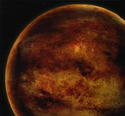
The Aaru system is host to a single planet, a seemingly barren desert world. However, underneath the surface a massive array of caverns, large enough to host a diverse biosystem and their own weather patterns.
The planet is noteworthy for being the first source of armed conflict between humanity and an alien species. Although the Shaltari tribe that attempted to induct mankind as a client race left peacefully after their rejection, a different tribe was furious with the presence of humans on the world. The Mongols, as they came to be known, attacked the planet in an attempt to dislodge the new inhabitants. Greatly technologically outmatched, the EAA suffered massively lopsided casualties, and only eventually emerged victorious due to their numerical superiority.
Due to the vast cavernous structures and the reluctance of the Scourge to go too deeply underground, more humans survived on the planet than any of the other cradle worlds. Millions of humans are present, living under the light of bioluminescenct fauna. The largest military actions on the planet are not from humans at all, but between the Scourge and Shaltari, with Resistance forces proving a highly effective insurgency. The Shaltari forces are noteworthy in that the forces present are a multi-tribal alliance, led by the same Mongols who once fought for the planet.
It is unclear what particular value the planet holds, but the Shaltari are clearly deeply interested in taking hold of it.
Asgard

Asgard Prime contains the greatest known supply of metals, and once was the primary home of the EAA's military vehicle manufacturing facilities. Given the relative supplies of these valuable metals on the colony worlds, recapturing the planet is of high priority to continue fueling the reconquest efforts. The Resistance forces on the planet are more cohesive and effective than on other worlds. It seems some of the factories may still have remained operational and under human control, allowing them to better defend themselves and conduct insurgency tactics.
Small task forces were sent to the planet to establish contact with Resistance groups. Only a single ship, badly damaged by weaponry of non-Scourge origin, returned to report on what transpired. The Resistance forces, initially welcoming, soon betrayed them and ambushed the UCM. The system's foldspace nodes were shut down minutes after the surviving ship jumped back, locking the door into the Asgard system. It appeared the PHR had influenced some of the surviving humans and turned them against the UCM, but the system was now locked from entry.
Not all the troops perished in the ambush. Some escaped with still-loyal Resistance fighters, who shared with them a great prize they had hidden away; a still functional spacecraft from the days of the EAA. A lone soldier broke through the defensive fleets of the Scourge and PHR, dying in the process but managing the jump the ship back home. An audio log brought with him told the UCM of what was transpiring on Asgard Prime, and informing them to keep watch in case the surviving forces reactivate the node.
The two moons of Asgard Prime, Valhalla and Sessrumnir, also had installations built prior to the Scourge invasion, but their purpose is unknown. Scourge presence is high on both moons for similarly unknown reasons.
Tlalocan
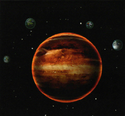
The last of the cradle worlds, Tlalocan is a gas giant with four Earth-like moons. Initially, no plans for any attacks were in place as the system remained without a functioning foldspace node. This changed when a UCM agent with a recently developed miniature foldspace node stowed aboard a PHR vessel in an attempt to locate their homeworld, who instead jumped into the Tlalocan system. The node was only active for a short time, and the agent promptly killed, but this was enough for the UCM to send in a Lysander stealth lighter to the system who dropped a stealth beacon of their own.
The ship observed a massive PHR fleet presence, and an ongoing assault by the PHR against the Scourge on the moons. No Scourge ships were active in the system, but debris scattered throughout the system suggests they had been wiped out by the PHR. As the PHR eliminate the last of the Scourge, they began to construct infrastructure to settle themselves into a long-term position on the moons.
Solar

A cradle world for humanity in the literal sense, Earth was home to the largest concentration of humanity, and therefore now contained the greatest population of Scourge. Reconnaissance operations were sent to scout the system and establish contact with any survivors, but their military might in the system was so great any direct actions against Earth were considered impossible at this stage in the reconquest. Aerial surveys of the planet observed the greatest amount of Scourge infrastructure seen in any of the cradle worlds, with vast breeding hives and seedship production.
Recon forces touched down on Earth and successfully made contact with resistance fighters, and learned that Earth had suffered the lowest survival rate of any of the worlds the Scourge had invaded. Despite this, the planet had been so densely populated that a great number of humans had persisted on.
When preparing to leave the system to report back, one of the ranking officers and his team did not return and were determined to be AWOL. Lt. Colonel James Rodriquez seemingly decided to stay and fight with the Resistance rather than return back to the colonies. He appeared to be directing and coordinating Resistance fighters towards New York City when last observed.
Elsewhere in the system, other teams were scouting the outer planets. They discovered intense mining of hydrocarbons from Titan, as well as water extraction from Europa. The water extraction was hypothesized to be due to a Scourge intolerance for biological contaminants. Given the high value the Scourge seemed to place on this supply, considering the ease with which they could purify water elsewhere, the first military action in the Solar system was authorized against it. Aa rapid strike by light ships against the moon destroyed the extraction infrastructure, but at a great cost, as many more ships were lost than expected to pursuing Scourge as they retreated to their jump marker.
One of the ships involved in the initial reconnaissance, a Lysander stealth lighter, was seemingly spotted and destroyed by a ship of non-Scourge origin near the moon of Callisto. No Lysander had ever been detected in such a fashion, raising alarms back home, with standing orders to avoid Callisto until a better picture of what transpired there can be made.
The Colonies
Ferrum

The Reconquest was treated as an entirely offensive campaign. Believing themselves secure on the colonies, with properly hidden nodes, the UCM was unprepared when a gigantic Scourge fleet jumped into the Ferrum system. Though inflicting disproportionate losses to the Scourge, ultimately the numerical advantage was too heavy and the Scourge managed to land millions of troops onto the surface. As the Scourge began to inflict grievous damage with the detonation of nuclear weapons, it was soon obvious that unlike the first invasion, the intention of the enemy was not to capture the planet and it's people, but to destroy them in retribution. The UCM managed to tip things into their favor as reinforcements arrived from the other colonies, but Scourge forces are still present on the system and killed nearly a billion of the inhabitants.
Aluminia

A planet sporting massive oceans, it's fisheries served as a rich source of protein for the rest of the colonies. The Scourge arrived and crushed the similarly unprepared defenders, and began landing troops on the surface. Here their plans were not simple destruction, as they began dumping vast amounts of waste and pathogens into the waters, poisoning the oceans and killing nearly all marine life. Reinforcements arrived and eliminated the Scourge, but were too late to save the oceans. Attempts to purify and clean the waters are now underway.
Wolfrum

A harsh, highly geologically active planet, Wolfrum is a rich source of metals and rare minerals, and serves as a penal colony of the UCM. With only a minimal garrison force,the Scourge landed with hardly any losses and began their campaign of destruction. The world is of a vastly different nature than the rest of the colonies, and so are those who inhabit it, and so the ease of the slaughter the Scourge enjoyed on the civilians of other worlds will not be the same on Wolfrum.
The Factions
Hawk Wargames started out with four factions. The 5th faction; called the Resistance was released in 2014.
United Colonies of Mankind

The UCM is the standard human faction. Olive green, sharp angles, wheels and tracks, lots of machine guns and railguns, the usual. They are twenty billion strong and all dedicated to retaking Earth. Their twelve main worlds are named after the Latin names for metals. Aurum is the largest and most urbanized of these and their present capital. Their dropships are named for birds, fast-moving aircraft for angels, tanks for swords, and wheeled vehicles for animals.
The nation has a strange combination of a socialistesque political environment and a military state. For example, there are politicians and they have power, but when push comes to shove, it's the military who holds most of the power. Not that anyone is really bothered by this; when you've been brought up with stories of the lost cradle worlds, among them the jewel called Earth, no one is gonna argue about too much spending on the military.
The UCM are a fairly normal looking faction populated by decent humans, so of course, they are - say it with me - the generalist faction. They have no glaring weaknesses, but no strengths either, can do most things well, yadda yadda. So, what's interesting about them? Well, for one, their airgame is among the best nowadays. They also have a few very weird but cool models, such as the drone-spewing Ferrum or the Mortar team, the only infantry with indirect fire in the game. In fact, UCM does blasts and barrages better than most.
Scourge

Malicious alien brain squids who lead a fairly miserable existence without a host, they want nothing more than to share that misery with others by injecting their young into their prisoner's ear canals and making them a flesh puppet. They have a merciless glass cannon strategy and love blasting things with plasma. Those Scourge unlucky enough to mature past prime brainjacking age get permanently installed in a vehicle; these either float or walk.
The UCM doesn't understand how they communicate and coordinate; that's a big goal of the first phase of reconquest.
Their vehicles have been given names like "Despoiler", "Reaper", and so on, as a result of being generally nasty all the time.
Post-Human Republic

Thanks to technology given by the White Sphere, the humans who escaped Vega IV have upgraded themselves into post-human cyborgs. They are only three billion strong, but very powerful on a unit-per-unit basis, with clean lines, tan colors, and walkers as well as tanks. The UCM don't like them because they think they're cowards, calling them "Abandonists", while the PHR don't like the UCM for being warmongering zealots. They aren't directly governed by the White Sphere anymore, but they do trust it quite a bit, and nobody (not even the PHR) knows where it really comes from.
Their vehicles are all named after gods from various mythologies -- mostly Greek and Roman, but Egyptian, Celtic, and Norse god-names are also used.
They also have Sirens, who are all-women elite warrior units who fight with twin pistols.
Shaltari Tribes

The Shaltari are extremely long-lived, having mastered the art of transferring their consciousnesses into new bodies. When death of natural causes is no longer an issue, they simultaneously fear death and yet venerate war as the only pursuit worthy of respect. People who haven't seen battle yet don't even get names.
Their greatest technological advantage is that, rather than carry their units, their dropships are actually teleportation gates: units can enter one vehicle and get popped out of another one. In contrast to the Scourge and their homogenous arsenal of plasma weapons, Shaltari weaponry is a mix of energized particle beams, focused microwave emitters, and the occasional extreme velocity railgun.
The various sub-nations of the Shaltari are named after the nations of Native Americans (of both continents). Their units are named for traditional weapons and totem animals of various pre-industrial cultures.
Resistance
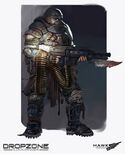
The Resistance are the descendants of the humans who managed to survive on Earth and escape capture and possession by the Scourge. They have a wide range of vehicles available to them, from salvaged or improvised vehicles such as gun technicals and mining drills, to remnants of the old military of the EAA such as standard battle tanks and fighter jets. They are likely the easiest faction to personalize a force around, given the wide range of possible backgrounds you could think up for them.
Links
Gallery
-
The Tau called, they want their dropships back.
-
This is a viable gaming table, by the way.
-
Yeah, I remember this level from the last Call of Duty!
-
Hedgehog-controlled orange battle-spiders in a forest.
-
Shaltari bridge crew in action.
-
-
-
-
-
-
-
-
-
External Links
- Dropzone Commander site.
- Model range on TTCombat's website.
- Orbital Bombardment competitive play Dropzone Commander fan blog.












